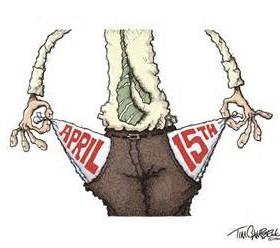 With income taxes due today, many U. S. citizens are coming face to face with the challenges of a still-lagging economy. Tax day is never pleasant but this year, with additional anxieties raised by disturbing world events, financial uncertainty reigns. Millennials, particularly, are struggling due to their high numbers of unemployment and underemployment – as well as the over $1.6 trillion they carry, as a group, in student loan debt.
With income taxes due today, many U. S. citizens are coming face to face with the challenges of a still-lagging economy. Tax day is never pleasant but this year, with additional anxieties raised by disturbing world events, financial uncertainty reigns. Millennials, particularly, are struggling due to their high numbers of unemployment and underemployment – as well as the over $1.6 trillion they carry, as a group, in student loan debt.
Into this environment, four candidates have officially thrown their hats in the ring for the 2016 Presidential election: Marco Rubio, Hillary Clinton, Rand Paul, and Ted Cruz; and many more are actively considering doing so: Jeb Bush, Scott Walker, Carly Fiorina, Mike Huckabee, Ben Carson, Chris Christie, George Pataki, Jim Webb, and Martin O’Malley, among others. Each candidate is crafting messages to current supporters and those they hope to win over.
With most of the 80 million Millennials of voting age by the 2016 elections, Presidential aspirants are interested in capturing this youth vote. How likely is that? It’s tough for a candidate to plan a strategy when polling of Millennials reveals conflicting views on many political issues, economics included. According to a Pew Research Survey, they oppose cuts to Social Security, even while believing no funds will remain for themselves in retirement. As a group, Millennials are socially liberal about certain issues, like the legalization of marijuana, but not on others, like gun control, and are the generation considerably more likely to identify themselves as Independents, not Democrats or Republicans.
Millennials have an increasing lack of trust in governmental institutions, preferring instead volunteerism and developing their own creative solutions to societal problems. They maintain a youthful optimism about their own economic future – the highest of any generation – even though they are the least likely to achieve the American dream, with their unemployment rate hovering around 12%.
If candidates can tap into the confidence, positive energy, and the enthusiasm of Millennials, they may be able to increase the traditionally low voting rate among the youth and garner their votes in 2016. Let the campaigns begin!

